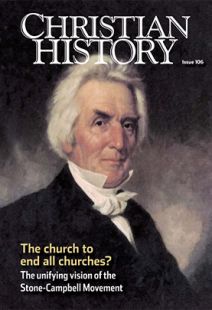No “soft soap”
AS AMERICANS STRUGGLES through the Great Depression, groups paraded with signs telling blacks, “Go back to the cotton fields—city jobs are for white men.” It was the summer of 1939, a few weeks before the outbreak of World War II. Seventy-six years had passed since the Emancipation Proclamation, but in many places separate drinking fountains still existed for blacks and whites.
That year, black preacher Marshall Keeble declared his own war—not on racism, but on sin and sectarianism. Collaborating with his faithful song-leader, William Lee, Keeble began a campaign in Hungtington, West Virginia, that resulted in eight baptisms.
Sin and error condemned
White community leader Joe Morris lavished praise on Keeble and Lee: “It was impossible for us to seat the audiences any night of the meeting. I have never heard nor seen greater power in the pulpit. Sin was condemned, error exposed, and the church and Christ exalted to the heavens, and no man can do this with a greater degree of success than Marshall Keeble.”
Marshall Keeble appealed to whites and blacks across the Jim Crow South, his audiences in some places consisting mainly of whites. Keeble’s “power in the pulpit” derived from his story-centered preaching and practical illustrations. He had a humble, nonthreatening demeanor, and his homespun wisdom and wit kept his listeners coming back for more.
White preachers in the Churches of Christ also admired Keeble because he was a “radical exclusivist,” arguing that those outside Churches of Christ were unsaved. “May God speed the day,” Morris wrote, “when soft-soaping preachers and neutrals among the white preachers will have the courage to condemn sin and error and exhort righteousness as does M. Keeble.”
Keeble was a native of Nashville, Tennessee. As a young man, he came under the spiritual influence of his father-in-law, Samuel Womack, and the social influence of Booker T. Washington (1856–1915). Keeble inherited his rigid exclusivism and high view of the church from Womack. From Washington, Keeble learned how to win the favor and finances of influential white leaders in the South, including his chief benefactor, insurance company founder A. M. Burton, who funded his preaching campaigns across the South and beyond.
Significantly, Keeble would not have received such generous, enduring monetary support had he challenged the racial status quo, as did many of his black contemporaries in the pulpit, such as Samuel Robert Cassius and G. P. Bowser, and those in the social and political arena, such as Henry M. Turner (1834–1915) and W. E. B. Du Bois (1878–1963).
Sons and grandsons
Though Keeble hated to see fellow African Americans lynched and discriminated against, he refused to oppose white racism publicly. For Keeble, leading black people to heaven was more important than helping them achieve racial and social justice in this life. As complex as he was famous, Keeble understood his white contemporaries and supporters better than they understood him, and he left an indelible mark on Churches of Christ and on American society.
His spiritual “sons”—Luke Miller, John Vaughner, and Lonnie Smith—evangelized thousands. He also had “grandsons,” young men who attended the Nashville Christian Institute, his K–12 school for black youth (1939–1967; groundbreaking pictured above).
These young men accompanied Keeble on his preaching and fund-raising tours. They eventually comprised much of the leadership of black Churches of Christ in the later twentieth century: Molefi Kete Asante (formerly Arthur Lee Smith Jr.), Franklin Florence Sr., Floyd Rose, and Fred Gray. Yet, in the end, they did something Keeble had not publicly done: they challenged America to live out “the true meaning of its creed—all men are created equal.” CH
By Edward J. Robinson
[Christian History originally published this article in Christian History Issue #106 in 2013]
Next articles
Freedom to speak, freedom to serve
Womens’ changing roles in the Stone-Campbell movement
Sara Harwell and Loretta Long Hunnicutt“New woman” same gospel
Silena Moore Holman argued for women’s equality in Stone-Campbell churches
Loretta HunnicuttWorldwide disciples, worldwide Christians
How this most American of religious movements flourished on the world stage
Gary HollowaySupport us
Christian History Institute (CHI) is a non-profit Pennsylvania corporation founded in 1982. Your donations support the continuation of this ministry
Donate



